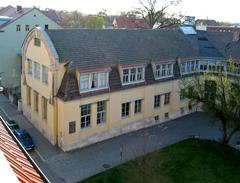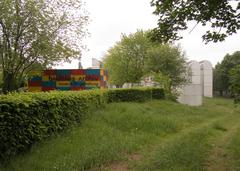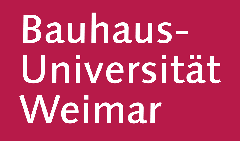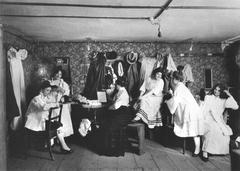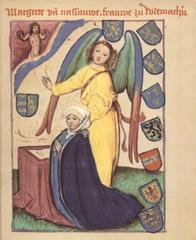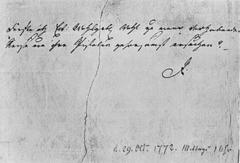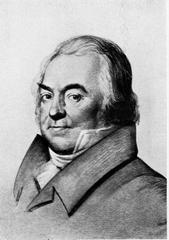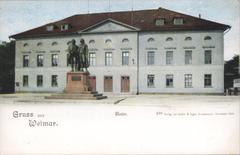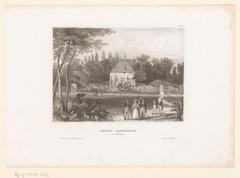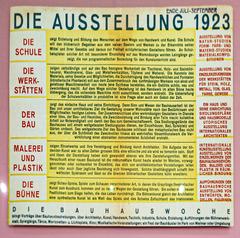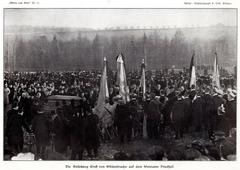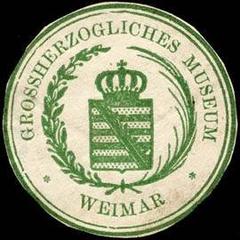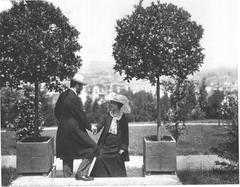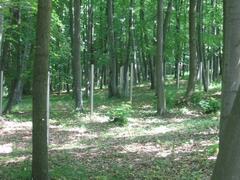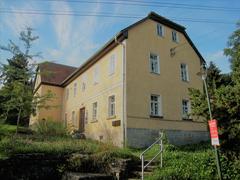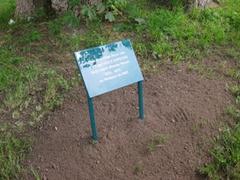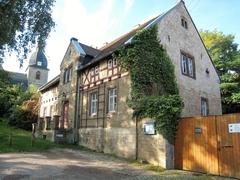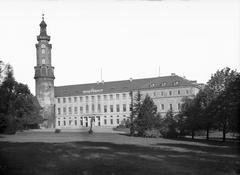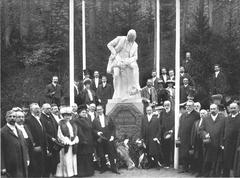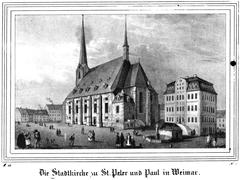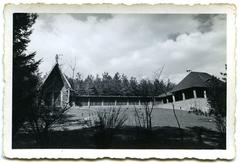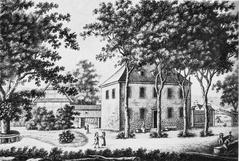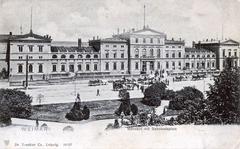
Deutsches Bienenmuseum Weimar: Comprehensive Visitor Guide, Tickets, and Insights into Weimar’s Historical Sites
Date: 04/07/2025
Introduction
Located in the cultural heart of Weimar, Germany, the Deutsches Bienenmuseum Weimar offers an immersive exploration into the world of bees and beekeeping. This renowned institution stands out for its extensive collections, interactive educational programs, and its significant role in celebrating and preserving the art and science of apiculture. Whether you are a history enthusiast, nature lover, or cultural traveler, the museum provides a distinctive addition to any Weimar itinerary, while also highlighting the crucial ecological and economic roles of bees (Mein Bauernhof; Bienenmuseum Weimar – Sammlung).
Table of Contents
- Introduction
- Museum Origins and Development
- Cultural and Scientific Significance
- Museum Highlights and Unique Features
- Visitor Information: Location, Tickets, Accessibility
- Special Programs and Events
- Nearby Attractions and Travel Tips
- FAQs
- Conclusion
- References
Museum Origins and Development
Founded in the early 20th century by Ferdinand Gerstung, the Deutsches Bienenmuseum Weimar was established to document, protect, and promote the tradition and science of beekeeping. The museum’s permanent exhibition features artifacts tracing the evolution of apiculture from medieval times to modern scientific practices. Its collection of over 1,500 objects—including historic beekeeping tools, rare manuscripts, and beeswax art—showcases technological innovations and the social significance of bees in Germany and Europe (Mein Bauernhof).
Cultural and Scientific Significance
Beekeeping in German History
Beekeeping (Imkerei) has played a vital role in German rural life for centuries. Before the widespread use of sugar, honey was the principal sweetener, and beeswax was crucial for candle-making and religious rites. The museum documents the transition from ancient straw skeps and log hives to modern movable-frame hives and highlights the contributions of German scientists to bee biology and hive design.
The Role of Bees in Society and Culture
Bees have long been revered in folklore and art as symbols of diligence and community. The museum’s displays illuminate the bee’s influence on customs, literature, and as political symbols, while also stressing bees’ essential role in pollination and food security—a topic of global urgency today.
Museum Highlights and Unique Features
Permanent Exhibitions
- Bee Biology: Detailed displays on anatomy, behavior, and hive organization.
- History of Beekeeping: Rare documents, photographs, and tools from centuries past.
- Modern Apiculture: Demonstrations on contemporary beekeeping practices, including a live observation hive (bienenmuseum-weimar.de).
Living Exhibits and Grounds
The museum features outdoor bee-friendly gardens and a demonstration apiary where visitors can observe bees in action. These gardens are planted with nectar- and pollen-rich flora, providing both habitat for pollinators and an interactive learning space (Mein Bauernhof).
Educational Engagement
Workshops, lectures, and hands-on activities are central to the museum’s mission. Programs cater to all ages, offering everything from beginner beekeeping to sustainability seminars and candle-making workshops.
Visitor Information
- Location: Ilmstraße 3, Weimar, Germany. The museum is near Ilm Park and Weimar’s city center (whichmuseum.de).
- Opening Hours: Tuesday–Sunday, 10:00 AM – 5:00 PM; closed Mondays.
- Ticket Prices: Adults €5–8; seniors/students €3–5; children under 6 or 12 free (depending on event). Check the official website for current rates and family/group packages.
- Accessibility: Most areas are wheelchair accessible, with ramps and accessible restrooms. Some historic sections may have limited access. Assistance is available upon request.
- Languages: Most exhibit texts are in German. English materials and staff assistance are available; visitors may also use translation apps (whichmuseum.de).
- Amenities: Shop and café with local honey products, beeswax candles, and bee-themed gifts. Outdoor seating is available (reviewhero.io).
Special Programs and Events
Annual Events
- Oßmannstedter Gespräche: An annual symposium gathering beekeepers, scientists, and professionals for lectures, panels, and exhibitions (bienendialog.de).
- Bienenmarkt & Adventsmarkt: Seasonal markets with local honey, beeswax goods, and crafts (weimar-lese.de).
- International Honeybee Day: Open house with tours, workshops, and tastings (fv-bienenmuseum.de).
- Backofenfest & Bunter Markt (May 1st): Festival with food, crafts, and family activities (allevents.in).
Educational Programs
- Children’s Discovery Track (Kinderstrecke): Interactive workshops and observation hives for children and families (stadt.weimar.de).
- School & Group Visits: Bookable guided tours and project days with hands-on lessons.
- Adult Education: Beekeeper training, sustainable agriculture, and environmental seminars (de.wikipedia.org).
Special Exhibitions
Rotating exhibitions connect beekeeping with broader environmental, artistic, and historical themes, such as “NATUR” and “Spuren des Krieges. Weimar im Sommer 1945” (bienenmuseum-weimar.de, stadt.weimar.de).
Nearby Attractions and Travel Tips
- Goethe’s House, Bauhaus Museum, and Park an der Ilm are all within walking distance, enabling a full day of cultural exploration (annees-de-pelerinage.com).
- Travel Tips: Limited parking—public transport or walking is recommended. Check seasonal opening times and event calendars before visiting. The museum is ideal for families and international visitors; translation assistance is available.
Frequently Asked Questions (FAQ)
Q: What are the current opening hours?
A: Tuesday–Sunday, 10:00 AM–5:00 PM; closed Mondays.
Q: How much are tickets?
A: Adults €5–8; reduced rates for students/seniors; children under 6 or 12 free (depending on event).
Q: Is the museum family-friendly and accessible?
A: Yes; interactive exhibits and outdoor areas are ideal for children. Most areas are wheelchair accessible.
Q: Are guided tours available?
A: Yes; regular and special tours are available in German and English. Group tours by appointment.
Q: Can I buy tickets online?
A: Yes, via the official website.
Conclusion
The Deutsches Bienenmuseum Weimar is a cornerstone of Weimar’s cultural and ecological landscape. Through its rich collections, carefully curated exhibitions, and active community engagement, the museum spotlights the vital relationship between humans and bees. Its accessible programs, family-friendly atmosphere, and central location make it a must-see for anyone interested in nature, culture, or the history of Weimar. For updated information, event calendars, and ticket booking, visit the official website or download the Audiala app for exclusive content and audio guides.
Plan your visit to the Deutsches Bienenmuseum Weimar and complement your trip with the city’s other major historical sites for a truly enriching experience.
References
- Deutsches Bienenmuseum Weimar Official Website
- Mein Bauernhof Deutsches Bienenmuseum Listing
- Deutsches Bienenmuseum Weimar: Visiting Hours, Tickets & Exploring Weimar’s Historical Sites, whichmuseum.de
- Oßmannstedter Gespräche Symposium, bienendialog.de
- Friends’ Association Event Page, fv-bienenmuseum.de
- Weimar Travel Guide, annees-de-pelerinage.com
- Museum Details, weimar-lese.de
- Museum Program, stadt.weimar.de
- Review Hero: Deutsches Bienenmuseum
- Allevents: Backofenfest & Bunter Markt



